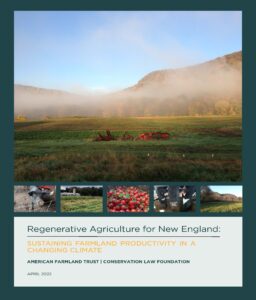American Farmland Trust and Conservation Law Foundation explore the opportunities for regenerative agriculture for New England farmers in this report. Using a combination of data, the report highlights the benefits of transitioning to regenerative agricultural practices to reduce emissions. Regenerative agricultural practices can increase carbon sequestration, improve soil health, increase crop yields, and protect water quality. In addition, the practices can also increase resilience to the impacts of climate change that our farmers face every year, including more frequent droughts, floods, and fires, altered growing seasons, and increased pests and diseases. Farmers are at the frontline of climate change, yet they can also have a major role in combatting it through the adoption of climate-smart regenerative agriculture. However, if New England’s farmers are to adopt regenerative agriculture on a meaningful scale, they must be provided sufficient technical and financial support to facilitate the transition.






